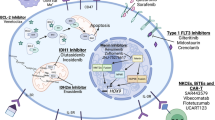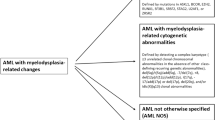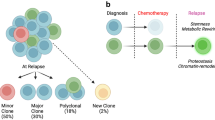Abstract.
All-trans-retinoic acid (ATRA) has been incorporated in front-line therapy for newly diagnosed acute promyelocytic leukemia (APL). We conducted a multicenter study of differentiation therapy with ATRA alone or in combination with chemotherapy followed by intensive postremission chemotherapy in patients with APL (the JALSG APL92 study), and analyzed prognostic factors to increase the cure rate in our subsequent trial. From 1992 to 1997, adult patients with newly diagnosed APL received oral ATRA 45 mg/m2 daily alone until complete remission (CR) if initial leukocyte counts were <3.0×109/l, and ATRA daily plus daunorubicin (DNR) 40 mg/m2×3 days plus enocitabine (BHAC) 200 mg/m2×5 days if leukocyte counts were ≥3.0×109/l. If peripheral blasts exceeded 1.0×109/l during therapy, DNR×3 days plus BHAC×5 days was added. After CR was achieved, three courses of consolidation and six courses of maintenance/intensification chemotherapy were administered. Of 376 patients enrolled, 369 were evaluable (median age 46 years, range 15–86 years; median leukocyte counts 2.0×109/l), and 333 (90%) achieved CR (94% of patients treated with ATRA alone, 88% with ATRA plus later chemotherapy, 89% with ATRA plus initial chemotherapy, and 86% with ATRA plus initial and later chemotherapy). At a median follow-up of 45 months, the predicted 6-year overall and event-free survival (EFS) rates for all patients were 65% and 52%, respectively. Favorable prognostic factors for CR were younger age, no or mild purpura, high serum total protein level, low lactate dehydrogenase level, and no or mild disseminated intravascular coagulation (DIC). Favorable prognostic factors for EFS were leukocyte counts <10.0×109/l, mild DIC, and no sepsis during induction therapy. In the JALSG APL97 study, we intensified chemotherapy for patients with leukocyte counts ≥3.0×109/l, and are randomly testing whether further chemotherapy is required for APL patients with negative PCR for PML/retinoic acid receptor α in the maintenance phase.
Similar content being viewed by others
Author information
Authors and Affiliations
Additional information
Electronic Publication
Rights and permissions
About this article
Cite this article
Asou, N., Adachi, K., Tamura, Ji. et al. Analysis of prognostic factors in newly diagnosed patients with acute promyelocytic leukemia: the APL92 study of the Japan Adult Leukemia Study Group (JALSG). Cancer Chemother Pharmacol 48 (Suppl 1), S65–S71 (2001). https://doi.org/10.1007/s002800100308
Issue Date:
DOI: https://doi.org/10.1007/s002800100308




